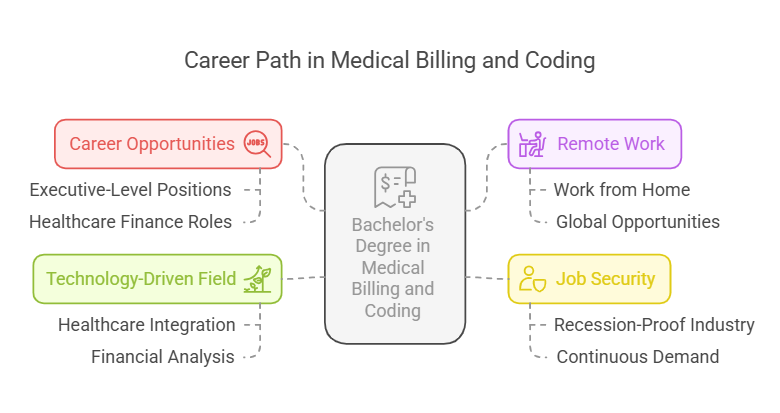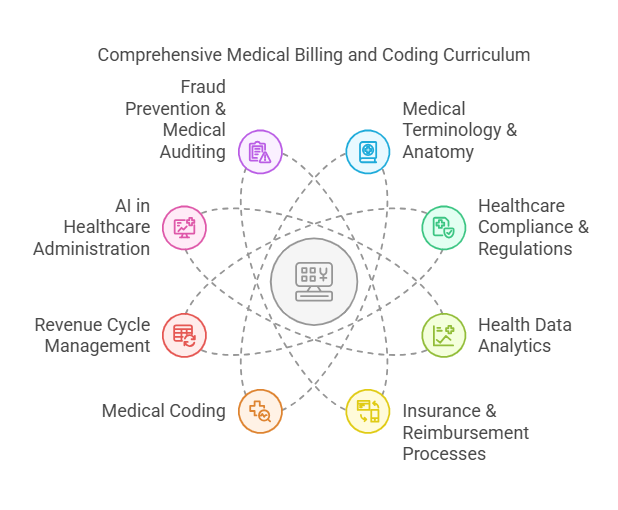Bachelor Degree in Medical Billing and Coding
Ever heard someone say, "I want a career that pays well, has job security, and doesn’t require a stethoscope"? Well, let’s talk about the Bachelor’s Degree in Medical Billing and Coding, a degree that might not make you a doctor, but it sure can get you paid like one!
Gone are the days when medical billing and coding was just an entry-level gig—today, it's a booming, technology-driven field where experts are earning six figures, working remotely, and securing executive-level positions in healthcare finance. In 2025, this career is no longer a “backup plan”—it’s a first-choice profession.
If you’re looking for a recession-proof career that combines healthcare, technology, and finance, while offering job security, remote work opportunities, and continuous growth, keep reading. We’re about to break down everything you need to know about pursuing a Bachelor’s Degree in Medical Billing and Coding, obtaining a medical billing and coding certification, what it can do for you, and how to leverage it for maximum career success.
What is a Bachelor’s Degree in Medical Billing and Coding?
A Bachelor’s Degree in Medical Billing and Coding is a four-year program designed to train professionals in the highly specialized field of medical finance and healthcare administration. This degree goes beyond basic coding—it equips students with knowledge in healthcare regulations, insurance policies, medical law, and data management.
Unlike a certificate or an associate’s degree, a bachelor’s degree opens doors to higher-paying roles, leadership positions, and advanced certifications in medical billing and coding.
A bachelor's degree is especially valuable in 2025, as the industry has evolved with advancements in Artificial Intelligence (AI), data analytics, and telehealth, increasing the demand for professionals with comprehensive expertise. For those pursuing this path, a financial aid guide for medical billing can be an essential resource to help manage the costs associated with obtaining the necessary education and certifications.
Why is Medical Billing and Coding in High Demand?
The healthcare industry is exploding, and every doctor’s office, hospital, and telehealth provider needs highly trained billing and coding specialists to ensure smooth operations.
Aging Population
With millions of baby boomers requiring medical care, there’s an increased demand for accurate billing and coding professionals to handle patient records and insurance claims efficiently.
Healthcare Regulations Are Changing
New medical coding updates, insurance policies, and compliance laws make certified professionals more critical than ever. Hospitals and clinics require well-trained specialists who can navigate the complexities of insurance claims and avoid billing errors that could lead to financial losses.
Growth of Telemedicine
With more patients choosing virtual consultations, the need for accurate digital health records and remote billing experts has skyrocketed. Telemedicine billing is different from traditional billing, requiring specialized knowledge that a bachelor’s degree can provide.
AI and Automation in Healthcare
While AI can assist with predictive analytics and error detection, human expertise is irreplaceable in handling complex medical cases, denial management, and ensuring proper compliance.
According to the U.S. Bureau of Labor Statistics, medical billing and coding jobs are projected to grow by 8% through 2031—faster than most industries.
Curriculum Breakdown: What Will You Learn?
A bachelor’s degree in medical billing and coding includes technical training, business management, and compliance education. The program ensures that graduates are well-equipped to handle the latest healthcare challenges.
Core Courses
Medical Terminology & Anatomy – Learn the language of healthcare to ensure accurate coding.
Healthcare Compliance & Regulations – Master HIPAA laws, data privacy, and industry regulations.
Health Data Analytics – Gain skills in electronic health records (EHR) management.
Insurance & Reimbursement Processes – Learn how to process claims, appeal denials, and maximize reimbursements.
Medical Coding (ICD-10, CPT, HCPCS) – Understand how to classify diseases and treatments using standardized codes.
Specialized Courses
Revenue Cycle Management – Learn the financial side of healthcare and ensure smooth payment workflows.
AI in Healthcare Administration – Understand how machine learning is reshaping medical billing.
Fraud Prevention & Medical Auditing – Detect and prevent insurance fraud.
Healthcare Leadership & Financial Management – Prepare for management positions in the field.
Top Benefits of a Bachelor’s Degree in Medical Billing and Coding
Higher Salary Potential – Bachelor’s degree holders earn up to 40% more than those with just a certification.
Remote Work Flexibility – Many companies offer work-from-home options, making this a perfect work-life balance career.
Job Stability – Medical billing and coding are recession-proof careers with continuous demand.
Leadership Opportunities – A bachelor’s degree allows you to move into management roles like Billing Director or Compliance Officer.
Eligibility for Advanced Certifications – Higher education makes you eligible for top-tier certifications like CCS-P (Certified Coding Specialist-Physician-Based).
Career Paths: What Jobs Can You Get With This Degree?
With a bachelor’s degree, you qualify for higher-paying and leadership roles, including:
Medical Billing Manager ($80K+)
Health Information Manager ($100K+)
Revenue Cycle Director ($120K+)
Medical Coding Auditor ($85K+)
Insurance Claims Analyst ($75K+)
Compliance Officer ($90K+)
According to the latest industry reports, certified coding specialists with a bachelor’s degree earn up to 20% more than those without a degree.
Medical Billing and Coding Salary in 2025
Source: U.S. Bureau of Labor Statistics
FAQs
1. Is a bachelor’s degree required for medical billing and coding?
No, but it provides a huge advantage in salary, career growth, and job stability.
2. Can I get a job with just a certificate?
Yes, but higher-paying jobs require a bachelor’s degree and certification.
3. How long does it take to complete a degree?
A bachelor’s degree takes four years, but some accelerated online programs can be completed in three years.
4. Can I work remotely with this degree?
Yes! Many healthcare providers offer remote positions for medical billing and coding specialists.
5. What are the best certifications to get after graduation?
Certified Professional Coder (CPC)
Certified Coding Specialist (CCS)
Certified Billing and Coding Specialist (CBCS)
Final Thoughts: Where to Get the Best Medical Billing and Coding Certificate
If you’re serious about a career in medical billing and coding, getting the right certification is key. Check out AMBCI—one of the best certification providers in 2025—to kickstart your journey and boost your earning potential! 🚀






